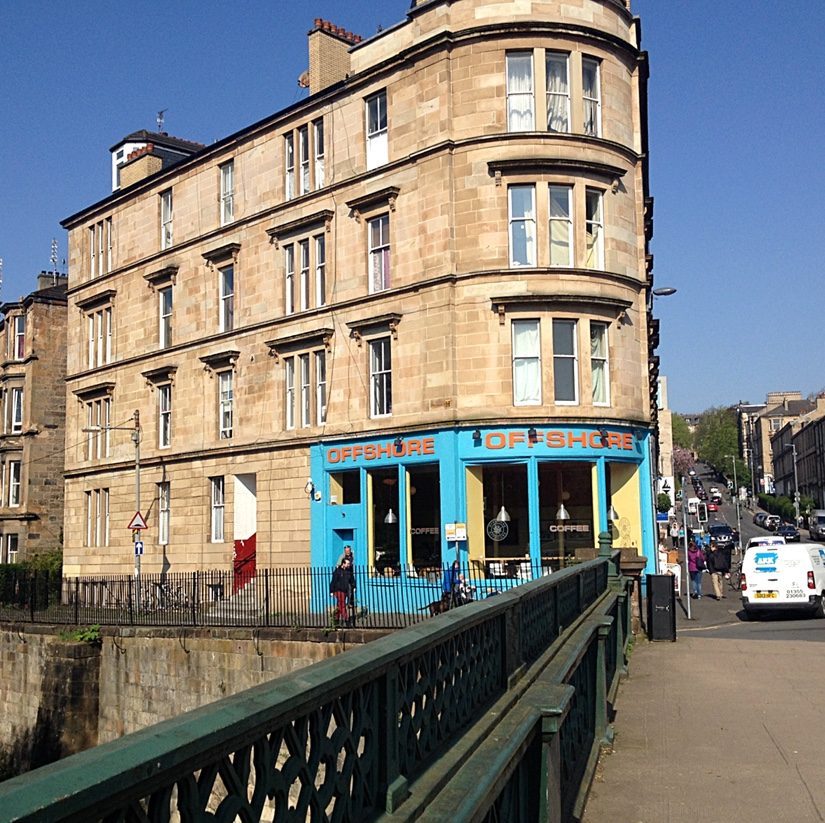Glasgow Writers: Paul McQuade

Paul McQuade was born in Glasgow but has subsequently found himself moving from Edinburgh to Tokyo to upstate New York, where he is currently working. Mostly on a way out of upstate New York. His work is available online and in print, most recently in Numéro Cinq, Gutter, and is forthcoming in Pank Magazine. He is currently working on his first novel.
Recently, Paul gained a distinction on the MLitt Creative Writing Programme at the University of Glasgow and won The Sceptre Award for New Writing 2014.
Examples of Paul’s Writing:
An Easement
Josh dreams of farmland. He has always dreamed of farmland. When he was fifteen, his parents took him from Minnesota to Ann Arbour. His mother taught English. His father grew up on a farm, but in Michigan, worked part time at a grocery store.
Josh preserves his parents: half his books are his mother’s, filled with her tiny marginalia, which Josh uses to summon her spirit since the cancer took her.
The books fill one and a half boxes. Josh lines them up in no real order in the upstairs study. When they are in place, he sits on the floor among them and looks at them. This is the first furniture we put into the house: Josh’s mother’s corpse.
Josh’s father is buried in Michigan, next to his mother. But as he looks out the study window, with the sunlight flaring the gold letters of the book-spines, he seems to see something out there, in the fields around the new house. I watch him from the doorway. I wonder if, perhaps, he sees his father’s body rising out of the ground, tall and thin, green as tomato stalks.
Beneath the Skin
published in Gutter #9.
Two beds once pinstriped: pale blue and white, tattered. The social worker notes their misshapenness, the uneven bumps made by a series of different bodies: dog-shapes, cat-shapes, man-shapes, bird-shapes. There are small tears in the fabric from claws and beaks and she makes a note of this too. I eye her sheet of paper as best I can, but I am not a good reader. I don’t trust shapes that stay still.
The Mojave. Afton Canyon sees the river burst its bonds of dry earth. It rises from below, as a kind of a resurrection, and the dead land is there made green. A jackal skulks warily through the sparse colour before lying in the shade of a railway bridge. Its ribs press against its skin as if demanding release. A train rackets over its laboured breathing.
Everything in the desert is death, they say. A place where the earth will not give. Here no corn stalks, no carrot flowers, no apples swelling red as blood drops. Only the bones of silver aircraft lined up in tombs near Mojave City.
The desert has its own relief. In the skin of cacti, in the soft pulse of aloe. At night the desert is pure silver. Lizards mine it. Snakes slither and cool bellies stewed all day in rock caverns waiting. Eggs crack in the dark.
Two coyotes meet on the desert plain. Black clubs of cactus shield them from the night wind. There they meet, two wanderers in the land of death. They circle each other hungrily.
Not pain but pressure. The body contorts. The head at the centre displaced, moved forward as the shoulders course in one great wave. There is a point, an instant, a moment of indecision. Then slowly, slowly. Slowly the bones come to a form. The skin moves like elastic, pulled as far as it will bend, then snaps into something new.
This is how a woman becomes a spider,
how a frog becomes a prince,
how wolves take human form
and discard it in the light of the moon.
My brother’s skin writhes. He is not good at being human.
The social worker does not see. She sees two children, meek as mice, shoulder to shoulder on a ratty bed. She is also adept at transformations. She transforms us into words: hair (clean), skin (no sign of violence), teeth (some decay), weight (on the thin side, but not malnourished).
She does not write: Alice and Munroe are two happy children who like living at home. They have no toys because all their pleasure is inside them: tail-chase, claw-dig, balance of a lizard leg on the sofa edge. They do not need school or words or other people. Theirs is a world closed off to others. The formation of a pack. Cease investigation. Burn the files. Let the wind take the ashes.
She writes: Cause for concern.
Pat Byrne, June, 2014.
This section: writers, Writing
Related Pages
- Storytelling for Adults, Mary Edward – Blending Fact and Fiction review Pat Byrne
- Melancholia by Nina Quigley
- The Buttery, A True Glasgow Institution, review by Pat Byrne
- Mika and Me Optical Studios – Exclusive Chanel Event
- Glasgow Writers: Willy Maley
- Ashlyn’s 18th at Topolabamba, Glasgow
- Close Range Coulport – poem by Finola Scott
- Alan Sharp and From Greenock to Hollywood at the Glasgow Film Theatre
- To See Ourselves – film about the lead up to the Scottish Referendum in 2014
- Mary Irvine’s Blog: The Magic Scales by Paul Murdoch
- Cast A Cold Eye – Robbie Morrison
- Secret Wrapped in Lead by Braw Clan
- Glasgow Writers: Pauline Lynch
- Mary Irvine: Review of ‘Gods of the Crossroads’ by Robin Lloyd-Jones
- SCCAN Stories for Change – PLACE Workshop
- Mary Irvine’s Blog: Review of Warp and Weft by Ann MacKinnon
- Home Grown In Glasgow – a poem for International Women’s Day by Ruby McCann
- Le Vent du Nord, Celtic Connections 2023
- Best Laid Schemes – Dexter Gordon Place
- Mary Irvine’s Blog: ‘Blackbird Singing’ – an evening with Graham Morgan



Leave a Reply
You must be logged in to post a comment.